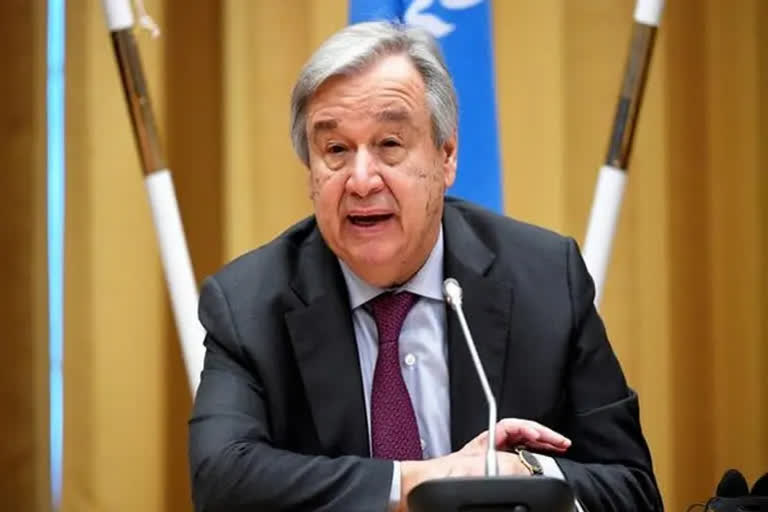United Nations: Russian nuclear forces being put on high alert is a chilling development and the mere idea of a nuclear conflict is simply inconceivable, UN Secretary General Antonio Guterres said on Monday, voicing hope that direct talks between Ukraine and Russia will produce an immediate halt to the fighting. The fighting in Ukraine must stop. It is raging across the country, from air, land and sea. It must stop now, Guterres told a rare emergency special session of the UN General Assembly on Ukraine.
A day after the 15-nation UN Security Council voted to refer the Russia-Ukraine crisis to an emergency session of the General Assembly, the most representative body of the United Nations convened the rare emergency session on Russia's aggression against Ukraine. President of the 76th session of the General Assembly Abdulla Shahid presided over the unprecedented session, only the 11th such emergency session of the General Assembly since 1950. With the adoption of the UNSC resolution on Sunday, it was for the first time in 40 years that the Council decided to call for an emergency special session in the General Assembly. Escalating tensions, Russian President Vladimir Putin ordered his nuclear forces be put on high alert, a development that drastically raised fears and concerns the crisis could lead to a nuclear war.
"We are facing a tragedy for Ukraine, but also a major regional crisis with potentially disastrous implications for us all. Yesterday, Russian nuclear forces were put on high alert. This is a chilling development, Guterres said. "The mere idea of a nuclear conflict is simply inconceivable. Nothing can justify the use of nuclear weapons, he said.
As Belarusian leader Aleksandr Lukashenko hosted the first face-to-face talks between the Russian and Ukrainian delegation since Russia's special military operation in eastern Ukraine, Guterres hoped that the direct talks between the two sides will produce not only an immediate halt to the fighting, but also a path towards a diplomatic solution. "The guns are talking now, but the path of dialogue must always remain open. It is never too late to engage in good-faith negotiations and to address all issues peacefully, he said.
Also Read: World facing biggest security crisis in recent years, says UN chief on Russia-Ukraine tensions
Guterres said that the escalating violence, resulting in civilian deaths, including children, is totally unacceptable. "Enough is enough. Soldiers need to move back to their barracks. Leaders need to move to peace. Civilians must be protected, he said. He asserted that the sovereignty, independence and territorial integrity of Ukraine, within its internationally recognized borders, must be respected.
The attack on Ukraine challenges international law and the multilateral system rooted in the UN Charter. Some of the possible consequences of a worsening conflict are terrifying to contemplate. Regional tensions are rising, he said. Guterres told the General Assembly that although Russian strikes are reportedly largely targeting Ukrainian military facilities, the UN has credible accounts" of residential buildings, critical civilian infrastructure and other non-military targets sustaining heavy damage. He also voiced concern that the world faces what could easily become Europe's worst humanitarian and refugee crisis in decades, with the numbers of refugees and internally displaced people multiplying by the minute.
While expressing gratitude for the compassion, generosity and solidarity of Ukraine's neighbors who are taking in those seeking safety, Guterres appealed that this solidarity is extended without any discrimination based on race, religion or ethnicity. Highlighting the actions being taken to combat the crisis, Guterres said he has allocated USD 20 million from the Central Emergency Response Fund to support emergency operations along the contact line in the eastern oblasts of Donetska and Luhanska and in other parts of the country. This measure will allow the organisation to help more vulnerable people get the basics -- shelter, food, water and health care.
Guterres also appointed Amin Awad as the UN Crisis Coordinator for Ukraine, who liaise with the Government and all relevant actors on the ground -- supported by the Resident and Humanitarian Coordinator and the UN Country Team. The UN will launch two coordinated emergency appeals for Ukraine and the region, one that addresses escalating humanitarian needs inside the country including rising internal displacement and another that responds to the needs of people crossing international borders to seek refuge in countries neighboring Ukraine. "We need to focus on solving problems, not making them worse. In cities around the world, people are taking to the streets and demanding an end to war. People in Ukraine want and need peace. I believe people in the Russian Federation do, too, he said.
PTI



